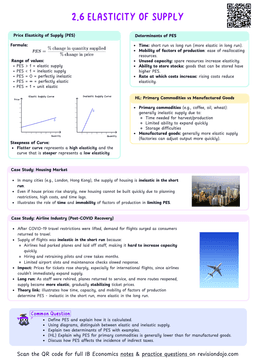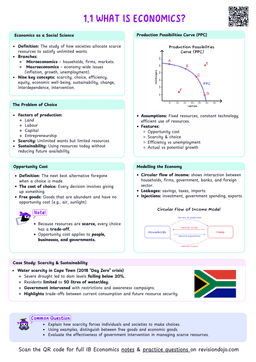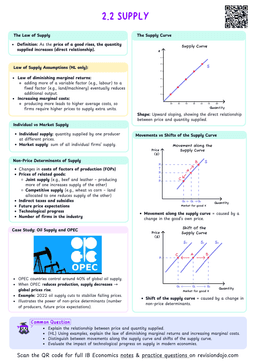Rational consumer choice
Economic theory where consumers make choices in their best self-interest trying to maximize utility.
Most economic models and theories are based on the idea that decision-makers maximise their own satisfaction:
- Consumers maximise their utility (satisfaction from buying a good or service).
- Producers maximise their profits.
- Workers maximise wages.
- Investors maximise returns.
However, as we will discover in this section, these assumptions may not always hold.
Assumptions behind the rational consumer choice
Consumer Rationality
Rational consumer choice assumes that consumers are rational. In economics, consumer rationality exists when consumers follow these three principles:
- Completeness.
- Transitivity.
- Non-satiety.
Completeness
- Consumers can always rank goods and services in order of preference.
- They can state with certainty whether they prefer good $X$ to good $Y$, $Y$ to $X$, or if they are indifferent between the two.
Transitivity
- Preferences remain consistent and do not cycle.
- For example, if a consumer prefers good $X$ to good $Y$, and good $Z$ to good $X$, they will also prefer good $Z$ to good $Y$.
Non-satiety
- More is always better.
- Having more of a good or service is preferred because it increases utility or satisfaction.
Utility Maximisation
- Consumers aim to maximise utility in each of their choices.
- Given a budget constraint, they choose the goods or services that lead to them having the most utility.
Perfect Information
- Assumes consumers have access to all relevant information about their options (e.g., prices, quality, alternatives).
- Hence there is no uncertainty in their decision.
Imagine there are 3 goods. One slice of Pizza, A bowl of Pasta and 2 Burgers.
- It is assumed you can rank the 3 by your preferences always,
- If you had more of any item, then it would be better.
- You know all the information you need about them for you to rank them (how much each costs, how much utility they bring you...).
- You will eat the one you prefer the most (derive the most utility from).
Behavioural economics: limitations of the assumptions of rational consumer choice
Behavioural economics
A relatively recent field of economics founded on the notion that human behaviour is significantly more complex than the traditional assumptions of rational consumer choice.
- Behavioural economics highlights the psychological, emotional, and social factors that influence decision-making.
- Challenges the idea that consumers always act rationally.
There are 5 main factors that behavioural economics considers to influence the rational consumer choice:
- Biases.
- Bounded rationality.
- Bounded self-control.
- Bounded selfishness.
- Imperfect information.
Biases
Human brains simplify complex decisions using cognitive shortcuts, or biases, causing systematic errors in judgement. Examples of cognitive shortcuts are:
- Rules of Thumb: Simplified guidelines based on experience and common sense that make complicated choices and ideas simpler to understand.
- Anchoring: Use of irrelevant information to make decisions that still affect judgement (likely due to it being the first piece of information)
- Framing: The presentation of choices to decision-makers affecting their judgement (how the choices are framed)
- Availability: Most recent information that people rely upon even though there's no reason to trust this over older information (recency bias)
Rule of thumb
- One portion of salad is simplified to a handful.
- A cup of soda has about 5 teaspoons of sugar.
Instead of doing complicated calculations, simple rules simplify decisions.
Anchoring
- You find a shirt that is worth $\$ 50$.
- Then you find another similar shirt worth $\$ 40$ so you think you have a bargain and buy it.
- Turns out you could've bought one for $\$ 25$.
You don't have all the information about all decisions and use irrelevant information.
Framing
- Saying kills 99.99% germs vs doesn't kill 0.01% germs likely results in people buying the first product even though both represent the same thing.
- Iphone from the official apple store vs Iphone from a retail store, even if both are the same product, people prefer the first usually.
How the information is presented can affect the decisions.
Availability
- Recently getting more emails about how Samsung is better than Apple will likely result you in buying a Samsung product.
- When you're hungry, if you suddenly see some food item you will likely crave that food item.
Information available recently impacts the most.
Bounded rationality
Herbert Simon’s concept of bounded rationality suggests that people cannot process all available information due to:
- Cognitive limitations
- Time constraints
- Complexity.
Instead of optimising, people "conform". They choose an option that is good enough. Hence consumers are only rational under limits.
NoteBounded rationality explains why consumers often rely on shortcuts like brand loyalty or recommendations instead of exhaustive research.
Bounded self-control
- Bounded self-control is the idea that even when people know what’s best for them, they often lack the self-control to act accordingly.
- They never behave exactly as they should.
- A shopper sets a budget for groceries but overspends after seeing tempting snacks at the checkout counter.
- Marketers exploit bounded self-control with tactics like "limited-time offers," encouraging impulsive purchases.
Bounded selfishness
- Rational consumer choice economics assumes people act purely out of self-interest.
- Bounded selfishness acknowledges that humans often act altruistically, even at a personal cost.
A person donates to a disaster relief fund, gaining no tangible benefit but acting out of compassion.
Imperfect Information
- Consumers rarely have perfect information.
- They may lack the time, resources, or expertise to evaluate all options thoroughly.
- Often it's difficult to even comprehend limited information.
- The combination from all of the above leads to imperfect information.
Imperfect information often creates power imbalances, as sellers typically know more about their products than buyers do.
Theory of KnowledgeDoes altruistic behavior challenge the assumption that humans are primarily self-interested?
Self review- Can you explain why people may not act in best self-interest?
- Can you explain using any examples?
- Can you argue against the idea that 'consumers don't act rationally'


